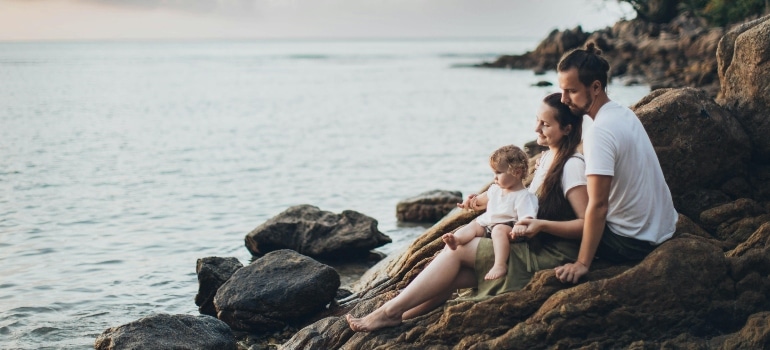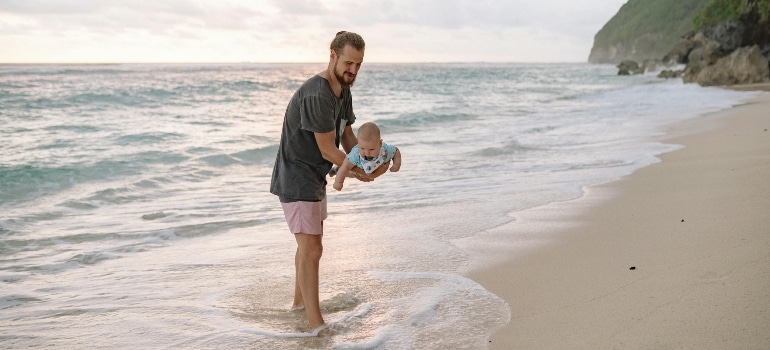Raising a Family in Iceland: The Pros and Cons for Expats

Get a Free Moving Quote Now!
Start Your International Moving Journey





Iceland draws many families who seek a safe and nurturing environment. People treasure its peaceful society, strong support systems, and child-centered culture. Many expats feel inspired by these features and set their sights on living there. Raising a family in Iceland strongly appeals to those who want tranquility and modern benefits. Parents also value a strong sense of safety. They appreciate the country’s advanced healthcare and education systems. Employment opportunities can look promising for skilled professionals. Proper planning is important for families who decide to relocate. A well-organized approach makes the transition easier and less stressful. Many families choose door to door international moving services for a direct and reliable process.
Key Factors That Shape an Expat Family’s Decision
Iceland features one of the most stable social structures in Europe. Families often feel comfortable due to the low crime rates and high standard of living. Parents can enjoy reliable healthcare systems and reputable education programs. Many expats gravitate here because of career opportunities in technology, tourism, energy, and creative industries.
- Well-regarded education options with public funding
- Safe environment with low crime
- Comprehensive healthcare system with few out-of-pocket costs
- Generous family policies such as parental leave
- High expenses, including rent and groceries
- Short days during winter and challenging weather
- Tight-knit communities that can be slow to welcome new arrivals
- Language barriers that require steady effort to overcome
The island’s emphasis on equality appeals to parents who want balanced social values. People admire the sense of community they find, especially when children join local programs and activities. Raising a family in Iceland can offer a fresh perspective for those seeking a supportive environment.
Is Iceland a Good Place to Raise a Family?
Statistics place Iceland high on lists of family-friendly countries. Many international surveys highlight its safety, gender equality, and well-funded public services. Crime rates stand among the lowest worldwide. Expats who consider moving to Iceland often discover that children have the freedom to explore their surroundings. Parents also benefit from healthcare services that involve minimal fees. Regular checkups and emergency treatments are part of the public system. This sense of security encourages families to settle and invest in their new homes.

Free or low-cost education often attracts parents. Public schools offer a creative curriculum that balances academics with social development. Teaching methods support problem-solving and teamwork. School meals may be subsidized in many areas. These measures help families control expenses while providing children with a well-rounded upbringing. Many schools also incorporate the Icelandic language into daily lessons. Students learn local customs, traditions, and history, which promotes a strong cultural understanding. Some expats opt for private or international schools if they prefer an alternative teaching approach.
Healthcare stands out as another positive aspect of living in Iceland. Residents enjoy universal coverage that reduces the burden of medical expenses. Parents can find pediatric specialists in larger towns and cities. Many professionals speak English, which eases communication for expats. Regular checkups, vaccinations, and emergency care are widely accessible.
Family-Oriented Work Culture in Iceland
Icelandic workplaces often promote flexibility and understanding for families. Parents can adjust schedules to accommodate childcare or school commitments. Generous parental leave laws allow new parents to spend time with their infants. These policies help parents establish a stable routine. Management teams usually respect these priorities. Local businesses also show support for employees who need to work remotely during school breaks or family obligations. Many expats see these benefits as a good reason to consider container shipping for their relocation.

Society values work-life balance. People avoid working late and prioritize personal activities and family events. Government programs provide resources for parents who need extra help or financial assistance. Many parents build meaningful careers without missing out on family life. Employers often encourage staff to use their vacation days and disconnect outside of work hours. This lifestyle allows families to recharge and explore Iceland’s natural sights together. Positive workplace norms can improve the overall well-being of expats with children.
What Is the Icelandic Parenting Style?
Parents in Iceland often nurture independence starting at a young age. Children learn how to dress themselves, help with household tasks, and explore outdoors. Playtime in nature is common, even during colder months. Fresh air is considered healthy, so strollers parked outside coffee shops are a frequent sight.
Discipline tends to be relaxed yet firm. Parents encourage open communication and clear boundaries. Children learn the natural consequences of their actions.
Education System and Bilingual Opportunities
Public education in Iceland enjoys a solid reputation. Schools emphasize creativity, practical skills, and community participation. Children engage in group projects that nurture teamwork. English instruction usually begins early. This eases communication for expat children. Many families also send kids to private or international schools if they seek specific curricula. Language support is available for newcomers, helping them master Icelandic. Packing services for overseas shipping can prove helpful when sending educational materials or extra items that children need.

Many expat parents discover that learning Icelandic is a worthwhile investment. Children gain a deeper connection to local customs through language. They socialize better and build friendships in school. Speaking Icelandic can also open job prospects as they grow older. English remains widely spoken, so families can still function with limited Icelandic skills at first. Schools and community centers support foreign families through language classes and after-school programs.
What Is the Downside of Living in Iceland?
Living costs rank among the highest in Europe. Rent consumes a large portion of a household budget. Groceries, personal care items, and dining out can strain finances. Many families track spending carefully to stay within limits. International moving prices add another expense if families arrive with many belongings. Energy costs can also rise during colder months. Some expats find that thorough planning helps them adapt to these conditions.
Winters can feel long, with limited daylight in midwinter. This can affect mood and energy levels. Families need to plan indoor activities and find ways to stay active. Local pools offer heated water year-round. Children learn to swim and play in warm pools even when it is dark outside. Some parents use light therapy lamps to combat seasonal depression. Others take vitamin D supplements to maintain healthy levels. Maintaining a positive outlook helps many families cope with these conditions.
Tight-knit communities can pose a challenge for newcomers. People in smaller towns may already have established social circles. A willingness to engage can lead to lasting friendships, but the process may move slowly.
Is Iceland Friendly to Foreigners?
Many Icelanders show an open attitude toward foreigners, especially in Reykjavik. English speakers can handle everyday tasks without major difficulties. Still, some cultural nuances take time to grasp. Politeness and direct communication define daily interactions. People value authenticity and prefer honest conversations over small talk. Icelandic society also encourages newcomers to participate in local traditions, which can build trust.

An effort to learn the language improves acceptance. Icelandic classes run throughout the year, including online options. Parents who speak the language can help children integrate better at school. Newcomers who invest energy in social events often form friendships more quickly. Activities such as sports clubs, music groups, and neighborhood gatherings create chances to meet locals. People who show respect for Icelandic ways find raising a family in Iceland easier.
Healthcare and Childcare Considerations for Expats
Iceland’s public healthcare covers most medical needs, but some treatments require supplemental insurance. Residents generally pay a small fee for doctor visits. Care for children involves regular checkups and immunizations. New arrivals who come after moving to Europe from the USA must register with local authorities. They receive ID numbers that provide access to healthcare and other public services. Specialists are available, though wait times may vary. Rural areas might require travel to Reykjavik for advanced care.
Childcare options are plentiful, especially in larger communities. Daycare centers accept children as young as one or two years old. Preschools emphasize play-based learning and social development. Costs vary, but government subsidies can offset some of the fees. Many parents form support networks with neighbors or friends. This creates a sense of community around childcare. Expat families often appreciate how quickly children adjust and make friends.
Preparing for the Move: What Expats Need to Know
Raising a family in Iceland requires a clear plan and an organized approach. Paperwork, housing searches, and job offers all need attention. Some expats secure job positions before arrival, which helps them meet visa requirements. Others prefer to explore options once they land. The climate calls for warm, waterproof clothing, along with proper gear for children. People who do their homework on local customs often settle with fewer hurdles. Early communication with Icelandic authorities ensures a straightforward immigration process.

Why Hiring an International Moving Company Matters
Long-distance relocations can feel overwhelming, but experienced movers simplify the process. A professional team handles shipping, customs documentation, and scheduling. Families avoid dealing with complicated regulations at ports. International household goods movers coordinate details so parents can focus on work, children, or other tasks. Communication remains key during this process. Many companies assign a single point of contact for updates and guidance.
Moving from the USA involves customs rules specific to Iceland. A good moving company offers advice on packing requirements and prohibited items. They assess shipment size and recommend cost-effective solutions. Some families pick door to door international moving services for maximum convenience. Others choose partial services if they plan to handle certain tasks themselves. Trustworthy movers add peace of mind since families know valuables arrive on time and in good condition.
Finding Housing and Settling into a New Community
Reykjavik holds the largest selection of rental properties and job openings. Rent can be high, but urban living offers easy access to schools, stores, and healthcare facilities. Rural areas feature quieter environments, but housing options may be limited. People who want a more laid-back lifestyle often search beyond the capital. Many expats suggest checking online forums or social media groups to locate available rentals. Real estate agents can also help, though their fees may add to expenses.
Purchasing a home requires a careful look at local regulations. Foreigners might need specific permissions before buying. Interest rates can be higher than in larger countries, affecting mortgage costs. Some families prefer renting until they gain permanent residency. Expat neighborhoods in Reykjavik often form small communities where people share tips on childcare, shopping, and language classes. Getting involved in local events accelerates the settling-in phase.
Social Integration and Making Connections
Expat groups on social media and community platforms organize meetups. Families gather for game nights, weekend outings, or holiday celebrations. These events foster friendships that can ease homesickness. Parents share resources and experiences, discussing schools, activities, and medical services. Cultural events present another path to bonding with locals. People celebrate traditions with food, music, and dancing. Joining these festivities offers insight into Iceland’s identity.

Children often integrate faster through school clubs or sports teams. Language barriers fade when kids engage in soccer, swimming, or art classes. Parents who volunteer at schools gain a better understanding of routines and expectations. Many Icelanders welcome involvement that shows genuine interest. Friendships formed here can last a lifetime, especially when children grow up together. A proactive approach helps expat families build meaningful relationships.
Long-Term Considerations for Families
Some parents aim for permanent residency or citizenship. Iceland offers various paths, although meeting the criteria takes time. Work permits, language proficiency, and proof of stable income matter. Once families settle, many adults explore career advancement or shifting roles. Some also compare opportunities in other Nordic countries before moving to Norway. It pays to stay updated on visa changes and job market trends.
Careful planning can shape a stable future for children. They grow up bilingual, enjoying the advantage of speaking English and Icelandic. Employment prospects in Iceland revolve around tech, tourism, energy, and creative fields. Many employers value adaptability and local language skills. Families who choose a long-term stay often embrace a slower pace and tight community bonds. Others eventually move back to their home country or explore new destinations with the experience gained here.
Is Raising a Family in Iceland the Right Choice for You?
Raising a family in Iceland comes with many rewards. Parents find quality education, child-focused policies, and a safe environment. Children benefit from independence and outdoor exploration. Healthcare systems serve most needs without steep fees. Work culture respects personal lives, encouraging a healthy approach to balancing jobs and family. This place can become a second home when embraced with open-mindedness.
